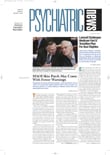Although the resilience of children growing up in adverse circumstances is well documented, relatively little has been known about adults' ability to“ tough it out” when the going gets rough.
However, that may be changing. Recently, California investigators found that resilience among college students constituted not just recovery from adversity, but a personal growth from it that may strengthen them against more of life's insults (Psychiatric News, September 2).
And now New York City investigators have found that the majority of New Yorkers were resilient in the aftermath of the September 11, 2001, terrorist attack on the World Trade Center.
The study was headed by George Bonanno, Ph.D., an associate professor of clinical psychology at Columbia University. Results are in press with Psychological Science.
Most adults are exposed to at least one potentially traumatic event, such as a physical or sexual assault or a life-threatening accident, in their lifetime, past studies have found. But to what extent are adults resilient after such events? Bonanno and his team decided to find out by examining the prevalence of resilience among New Yorkers during the six months following the September 11 attack.
Adults in New York City and nearby areas in New York, New Jersey, and Connecticut were contacted by random-digit dial about six months after September 11 to see if they would agree to a phone interview. Thirty-four percent did. The final sample of 2,800 represented the broader New York population, as evidenced by comparison with the most recent census data.
During the phone interview, participants were assessed for the presence of the 17 symptoms that constitute posttraumatic stress disorder (PTSD). Here, the National Women's Study PTSD module was used, which has a sensitivity of 99 percent and a specificity of 79 percent when compared with PTSD diagnosed by the Structured Clinical Interview for DSM-III-R. Participants were also asked how close they had been to the September 11 attack, whether they had been physically injured by it, and whether they had lost loved ones in it.
Bonanno and his colleagues then analyzed the interview results to determine how many of the participants had displayed resilience to the attack, and particularly resilience under specific exposure conditions. They defined resilience as one or no PTSD symptoms, since studies of sub-threshold depression have typically set this as a criterion for the absence of depression.
Most Showed Resilience
Sixty-five percent of participants were resilient, the investigators found. Of particular interest to the researchers were the two small groups most directly endangered by the attack: the 22 individuals who were in the World Trade Center buildings at the time of the attack and the 59 individuals who were injured because they were near the attack site. Even though 25 percent of the 22 individuals who were in the buildings had probable PTSD, more than half met resilience criteria. And even though 26 percent of the 59 injured individuals had probable PTSD, about one-third showed resilience.
In fact, even in instances where people experienced multiple traumas, they often exhibited resilience. For example, a third of the 142 individuals who both experienced the death of a loved one through the attack and witnessed the attack were found to be resilient.
Resilience Definitions Varied
The researchers also explored using either a more stringent or more liberal definition of resilience. Even here, the results did not change to any substantial degree. For example, because some respondents may have been depressed even in the absence of PTSD symptoms, the investigators tried further narrowing the definition of resilience to include the absence of depression. However, this restriction did not appreciably lower the proportions of people showing resilience across exposure categories.
“On the whole, these findings demonstrate widespread resilience in the New York City area during the six months after the September 11th attack,” Bonanno and his team concluded. “Even among the groups with the most pernicious levels of exposure and highest probable PTSD, the proportion that were resilient never dropped below one-third.”
Expert Disagrees on Interpretation
“This investigation is an exemplary attempt to study the poorly understood concept of resilience using an existing database to capture the opposite—that is, the presence of serious mental health consequences of 9/11,” Randall Marshall, M.D., director of trauma studies and services at Columbia University, told Psychiatric News. “Dr. Bonanno is right about the need to take resilience seriously as a subject of scientific investigation, meaning future studies have to be designed to capture and understand resilience as an outcome and a process that is much more than the `absence of psychopathology.'
“That said, I cannot agree with the conclusion [that since 65 percent of New Yorkers showed resilient reactions, it demonstrates] high levels of resilience in the general population.... If we were discussing medical illness after exposure to an environmental pathogen, no one would be reassured that only 65 percent of persons did not experience any symptoms of illness at all.... Resilience should have been in the 90th percentile....
“[In short] large numbers of people did not demonstrate resilience after 9/11, and therefore we should devote much more attention to ways to enhance resilience and promote recovery.”
The study was funded by the National Institute of Mental Health.
“Psychological Resilience After Disaster: New York City in the Aftermath of the September 11th Terrorist Attack” will be posted at<www.ingenta.com/journals/browse/bpl/psci> once it is published. ▪
